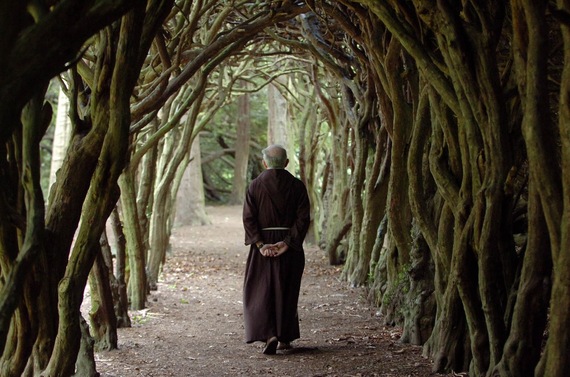The practice of mindfulness, coupled or uncoupled from traditional seated meditation, has exploded in popularity in recent years. Corporations and universities and even elementary schools bring in experts to lead workshops and foster ongoing sessions. Hospitals and doctors recommend it as a treatment for a variety of ailments from anxiety to chronic pain. Unlike many fads that explode across the media, however, mindfulness is not an empty gimmick or experimental approach but a practice that has its roots in the centuries-old tradition of Buddhism. So mindfulness gives not only tangible benefits for the body and mind, but, for those who are interested, it is poised to provide intangible benefits for the soul. But is it Christian?
In a word, no...which is not to say that it is in any way anti-Christian, or shouldn't be a part of Christian spiritual practices. But like all cultural phenomena, we counter-cultural Christians should view it with a hermeneutic of suspicion before deciding whether or not to jump on the bandwagon.
Mindfulness, in its most basic form, is simply a practice of awareness where we consistently bring our minds back into the present moment--that's it. Unlike other forms of meditation, there are no mantras, no specific postures or poses to be learned, no gurus or dharma talks necessary. There are no creeds or philosophies to memorize, and it is easy to learn on one's own through various free or low-cost resources available and can be done by anyone easily and conveniently, alone or in the presence of others. As such, it can be practiced by adherents of any or no religion without causing offense or upheaval, and may even improve one's ability to participate in religious worship or practices by teaching the mind to be free of distraction.
This type of mental focus, while most closely associated with Eastern religions, is not absent from Christian traditions. However, Christian practices lean more toward contemplation-focusing the mind on something such as a sacred text, music or icon which then facilitates a deeper understanding and/or felt experience of God. The object of contemplation doesn't even have to be inherently spiritual in order to fulfill this goal. Brother Lawrence believed that every aspect of daily life, particularly, in his case, the rough work of cooking and cleaning in a 17th Century monastery, can lead one to closeness to God when it is undertaken with love.
This is very similar to mindfulness, of course, except there is a philosophical goal-God. This is where mindfulness can be most helpful to Christians and other persons of faith. It can retrain our minds to see whatever is present in the moment without all the personal and cultural baggage that our constructs of God have accumulated over the millennia. If we wish to know God, we must strip away everything we think we know and are supposed to feel and come to the encounter afresh, or else we are not really understanding God but only the idea of God we have inherited from others. For this reason, I would urge any Christian, even if they are already engaged in contemplative practices, to learn and practice mindfulness as a way of cleansing their minds of automatic conditioned responses that actually inhibit our understanding of God rather than enhance it.
However, here is the caveat: if you take up mindfulness not to enhance but to replace religion, if its appeal is because of its non-threatening, inoffensive, benign nature, while I have no doubt you will still enjoy mental and physical benefits from it, you are likely to end up spiritually disappointed. The point of a religion is not that it slides easily into what you already believe and makes your life easier, but that it challenges you to grow, and may even make your life harder the more deeply you are called into it. While it is human nature to want to avoid difficulty, we are at the same time hard wired to crave challenge, because we know that it is by grappling with those challenges that we form our character and become something better than what we were before. SBNRs everywhere are looking for practices and causes to fill the spiritual void, and mindfulness is a popular, even healthy, way to fill it. But the restlessness will return, and those drawn to mindfulness will eventually search for something deeper, something that not only quiets their minds, but enlarges their spirits. We the church must mindfully equip ourselves to provide that for them.

